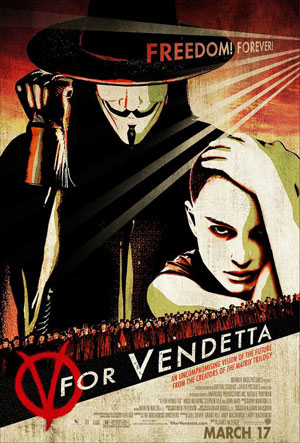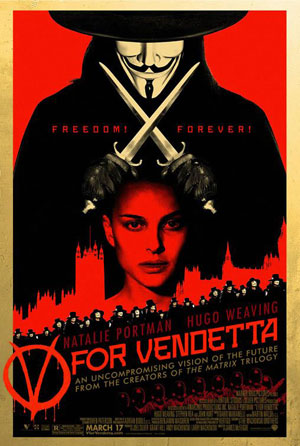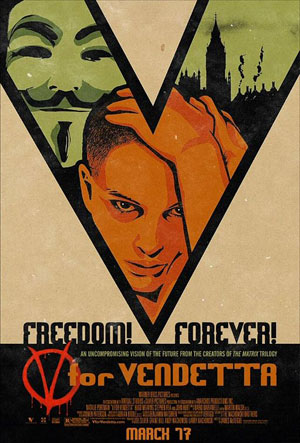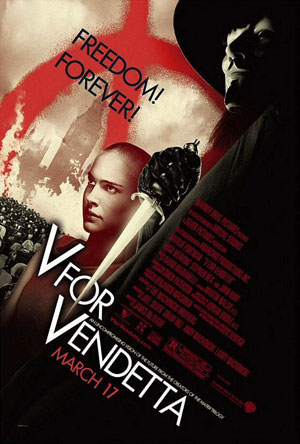 V For Vendetta is the most dangerous film of 2006.
V For Vendetta is the most dangerous film of 2006.
If you’re an idiot or a fascist, that is. Remember that when people begin complaining about this film, and try to figure out which of the two categories they fit in. Or maybe they’ll fit in both!
I cannot bring you a review of this film, since my name is not Harry Knowles or Drew McWeeny and this site’s initials are not AICN (no hate to these fine fellas and their site, it just chafes when I walk out of a screening and get the “no reviews until release” reminder and know that the film has been already reviewed on other sites. That’s a whole different editorial, though!), so this is not my review of James McTeigue’s V For Vendetta, based on the graphic novel by Alan Moore and David Lloyd. Rather this is an editorial about this brilliant piece of work.
It’s shocking that a film like V For Vendetta, in which the hero can be described in no other terms but terrorist, has been made by a major movie studio, which is itself a part of a major, world-dominating corporation. Either the folks at Warner Bros and Time-Warner weren’t paying a lot of attention or they just don’t think that a movie will make any bit of difference at this point. I couldn’t disagree more, and I have to tell you that if I was still actively working as a political organizer I would be standing outside theaters showing V and handing out anti-Bush and anti-Iraq War pamphlets to exiting moviegoers. Sure, this film is about a fictional fascist state that denies its people basic liberties and makes them live in fear, and sure it’s set in the London of the future, but there’s no hiding the fact that the film’s timeline is one that begins today.
AICN’s Drew McWeeny wrote a piece about the film where he said that the right-wingers who are already bristling about the movie (and feel free to check out some of these goose-steppers over at the Libertas forum, where they hurl invective at a film they haven’t seen and say the main character looks “gay.” Hey, isn’t it interesting that the fascistic future rulers of England corralled and exterminated gays in the film?) should check themselves – the movie is anti-fascism, and not taking on a particular current American ideology. He’s right. Sort of. But it’s no accident, no mistake, that the fascist government of this film is a conservative Christian one.
The Dead Kennedys wrote a very good song called California Uber Alles, about then-California governor Jerry Brown and his aggressively liberal policies. The song is funny. A few years later the band remade the song to be about former California governor Ronald Reagan. It wasn’t really so funny anymore. The Smiley Faced, be happy or else fascism of the original song is satire while the remake is stark reality. As much fun as it is to muse about a liberal fascist  state, the realities are two-fold: one, there is no serious liberal political presence in this nation. The Democrats, while putatively liberal, are at best middle of the road, and more accurately right of center. Two, it isn’t self-identified liberals keeping men in cages without the due process of law.
state, the realities are two-fold: one, there is no serious liberal political presence in this nation. The Democrats, while putatively liberal, are at best middle of the road, and more accurately right of center. Two, it isn’t self-identified liberals keeping men in cages without the due process of law.
The film is being very specific – the policies that we are pursuing have one end-point, and that is a society where our basic freedoms are curbed for supposed security and comfortable routine. We see it now – the right to privacy is under astonishing attack, and the only thing more worrying than how much our government wants to listen in on our conversations and know what books we check out of the library is how little the people care. “I don’t have anything to hide,” is the refrain, a bit of sick logic that implies the person who wants privacy does have something dark to hide.
Of course there’s also a universality to this – while the specific circumstances that lead to the creation of the world in the film are undeniably rooted in the Bush Administration’s Orwellianly infinite war on terror, the suppression of rights for security has long been a hallmark of American politics. Hell, John Adams, the second president of the United States, passed the Alien and Sedition Acts, which used fears of the new French revolutionary government to ban spoken or written criticism of the government, the Congress and the president. I once thought that, right or left, all Americans with a serious love for liberty could agree that limiting freedom is no way to save it. The last few years have proved me right in that those who would limit freedom, who would support illegal wiretaps or endless detentions, must despise liberty. So yes, the basic concepts and warnings of this work, which were crafted 25 years ago, could be easily adapted to deliver the same message in a timely way throughout history. But this film has been crafted to deliver that message specifically in relation to the world we currently live in.
What’s really freaking conservatives out, though, and will probably send such evil blowhards as Bill O’Reilly through the roof is the fact that V For Vendetta is a film in which the protagonist is a terrorist. Again, there’s no getting around that. You can call the guy a freedom fighter or an urban guerilla if you like, but essentially he’s a guy who wants to force political change by blowing things up. What will give these guys strokes is the fact that it works.
What’s happened in the world in the last few years is that we’ve had our dialogue taken away. Remember when conservatives freaked the fuck out about the PC movement – where they took offense at the idea that maybe it wasn’t cool to use unpleasant racial or sexual remarks? When they decided that being polite was some kind of liberal conspiracy? Well, we live in a world which has become PC times a thousand, where to even question the US occupation of Iraq or the way that the War on Terror has been fought is to be un-American. If you try to even begin to understand why a huge percentage of the Middle East hates us, you’re a jihadist sympathizer. Why do you hate America so much with your questions and refusal to just accept the party line? But for the love of God, don’t tell me I can’t call gays “faggots,” because that’s PC nonsense. V For Vendetta seeks to dynamite open that blocked dialogue and to confront us with many issues – what is our security worth? Is terrorism inherently evil? What the hell is terrorism anyway?
away. Remember when conservatives freaked the fuck out about the PC movement – where they took offense at the idea that maybe it wasn’t cool to use unpleasant racial or sexual remarks? When they decided that being polite was some kind of liberal conspiracy? Well, we live in a world which has become PC times a thousand, where to even question the US occupation of Iraq or the way that the War on Terror has been fought is to be un-American. If you try to even begin to understand why a huge percentage of the Middle East hates us, you’re a jihadist sympathizer. Why do you hate America so much with your questions and refusal to just accept the party line? But for the love of God, don’t tell me I can’t call gays “faggots,” because that’s PC nonsense. V For Vendetta seeks to dynamite open that blocked dialogue and to confront us with many issues – what is our security worth? Is terrorism inherently evil? What the hell is terrorism anyway?
V isn’t the only place these questions are being asked. Last week’s episode of Battlestar Galactica impressed me as it showed heroic human resistance fighters on Cylon-occupied Caprica blow up a café full of quite possibly innocent human-looking Cylons. Show creator Ronald Moore and his writers are no dummies – they took the characters we sympathize with, that we understand, who have been almost driven to extinction by the unspeakable aggression and brutality of the Cylons, and put them in the position of a Palestinian terrorist. We never saw what any of the Cylons killed in that explosion had done before. They may have been administrators or accountants – at least one was a barista. But the human resistance didn’t care if they had had a direct hand in the attempted genocide of the human race – they were complicit, guilty by association. And brilliantly the show puts us in the mindset of a terrorist. That’s the beauty of what art can do, and how it can present to us new ways of looking at issues we thought we had already covered.
Some would say that’s glorifying terrorism; smarter people would say that’s examining how terrorism happens. Which is V? I think in the end it’s riding a fine line; it’s not explicitly condoning terrorism, but it is making the argument that sometimes the people need to commit violence against the state. Ironically, this is a statement that conservatives should agree with – it’s the basis, they say, of their impassioned defense of the Second Amendment. Violence against the state will always be classified as terrorism – by the state. If the modern concept of terrorism had been in vogue in 1776, I can guarantee to you that that would be how the Revolutionaries would have been smeared by the British. Instead they had to stick to the usual old-fashioned lines of treason and such. In the end the American Revolution was  the illegal use of violence to make political change – and if you don’t believe it was illegal, I suggest you do some reading as to find out why the signing of the Declaration of Independence was such a big deal. Each man who signed that document essentially signed his own death warrant, should he be captured – the British didn’t recognize American sovereignty and saw the Revolutionaries only as traitors who would be hung.
the illegal use of violence to make political change – and if you don’t believe it was illegal, I suggest you do some reading as to find out why the signing of the Declaration of Independence was such a big deal. Each man who signed that document essentially signed his own death warrant, should he be captured – the British didn’t recognize American sovereignty and saw the Revolutionaries only as traitors who would be hung.
Much of V’s anti-conservative stance boils down to the meaning of the word conservative. The meaning in America today is eerily similar to the meaning it held in Thatcher’s dark Britain of the early 80s, the time this work was originally created in serial comic format. V is a film that confronts the lie of modern conservatism, showing that it’s not a movement about individual liberty and smaller government – if anything, it’s quite the exact opposite. It reminds us that those who wish to take away our liberties for safe-keeping are the true enemy. I keep waiting for true conservatives to wrest back the label from the (barely) crypto-(mostly)fascists who wear it today. Of course I’m still waiting for an actual liberal to stand up and take a bow on the national stage.
Most inspiring of all, though (and the movie’s climax is incredibly inspiring), is the film’s final statements that while violence against the state sometimes, in extreme circumstances, must be done with gunpowder, it can also be done with ideas and words. That’s why our dialogue has been so restricted for the last few years – the people in power, the people seeking more power by the day, know that their ideas of tyranny and fear cannot beat our ideas of hope and freedom. V For Vendetta is a dangerous film for these people and those who support them; it exposes their every trick. It gives the audience who perhaps hasn’t second-thought the continuing assaults on liberty and the rule of law in this nation a safe, action film shaped space to explore new concepts about where this country is going. And whether or not they like the inevitable destination.